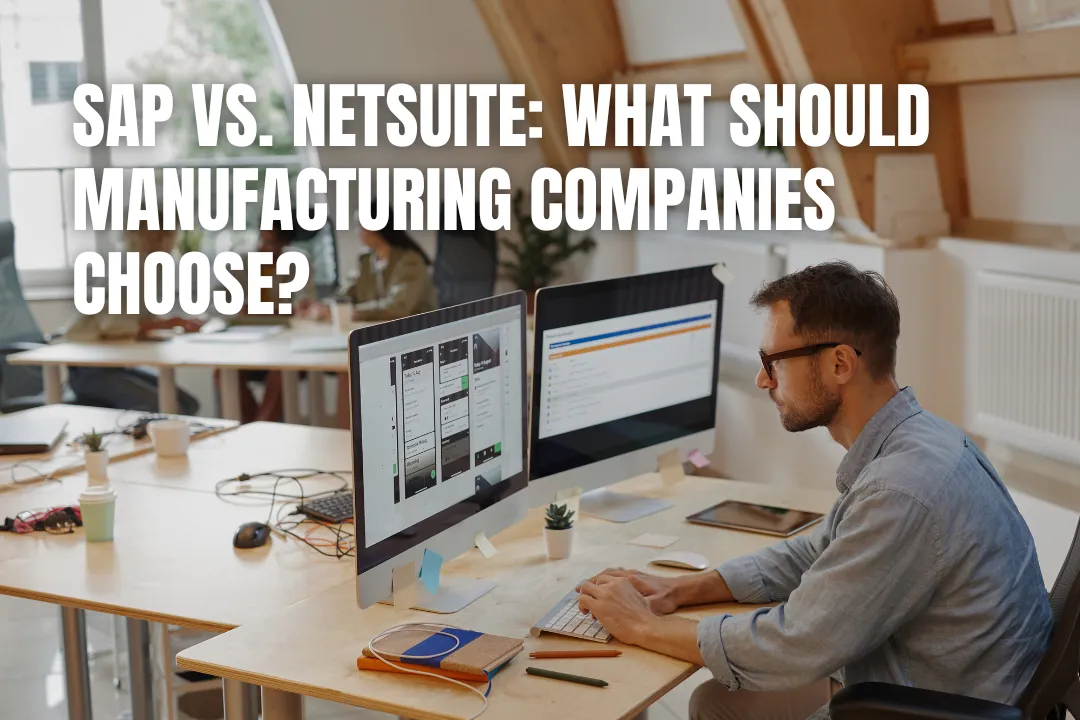
Editorial Disclaimer
This content is published for general information and editorial purposes only. It does not constitute financial, investment, or legal advice, nor should it be relied upon as such. Any mention of companies, platforms, or services does not imply endorsement or recommendation. We are not affiliated with, nor do we accept responsibility for, any third-party entities referenced. Financial markets and company circumstances can change rapidly. Readers should perform their own independent research and seek professional advice before making any financial or investment decisions.
If you're running a growing manufacturing company, chances are you're at that point where Excel just won’t cut it anymore. Orders are increasing, your team’s juggling multiple systems, and it’s easy to feel like you’re flying blind. You know you need an ERP system, but which one?
Two names keep popping up: SAP and NetSuite.
So... which one should you choose?
Let’s break it down in simple, real-talk terms, no jargon, no tech overwhelm. Just straight-up help so you can make the right choice for your business.
Before we go deep, think of it like this:
Here’s how they stack up:
You don’t need 20 modules you’ll never use. You need:
So let’s walk through how SAP and NetSuite serve manufacturers like you.
SAP has some serious muscle. It’s been around forever and is trusted by global giants.
What it’s great at:
BUT…
Best for: Enterprises with large IT budgets and a need for hyper-custom solutions.
NetSuite was born in the cloud. That means no hardware, no IT nightmares, and faster rollouts.
What it’s great at:
AND…
Best for: Manufacturers who want modern tools, fast implementation, and minimal IT headaches.
If you’re a mid-sized manufacturer trying to streamline operations, grow without hiring a full IT department, and want predictable costs, NetSuite is the better fit.
If you’re a multi-location enterprise with deeply complex workflows and a deep bench of IT experts, SAP might make sense, but be ready for a long (and expensive) ride.
Regardless of which ERP you choose, you’re going to need great people behind it. Not just tech folks, real sales development reps who can help fuel growth as your ops become more efficient.
That’s where scalable, data‑driven business development reps come in. Trained, outsourced BDRs can help you:
Because what’s the point of optimizing operations if you’re not growing revenue alongside it?
And if you’re still weighing options, big publications like Forbes and Entrepreneur offer solid ERP breakdowns too.
If you’re a growing manufacturer looking for:
Then NetSuite likely checks all your boxes.
But whichever ERP you land on, don’t go it alone. Surround your tech stack with smart humans who know how to sell, build, and scale.
Investing in the right ERP is just step one. To truly scale, you need the right people behind your growth engine. Tap into a team of scalable, data‑driven business development reps who understand your industry, your goals, and how to move the needle.
Your future revenue is waiting, let’s go get it.
SAP is like a custom-built, powerful system that needs significant time and resources to set up and run. NetSuite is more like a ready-to-use, all-in-one cloud solution that works well straight away.
For most growing manufacturing companies looking to streamline operations, avoid a large IT department, and have predictable costs, NetSuite is generally a better fit. It offers quicker deployment and lower overall ownership expenses.
Implementing SAP can often take a year or even longer due to its complexity and customisation needs. NetSuite, being cloud-based and pre-built, typically deploys much faster, often within three to six months.
NetSuite is a cloud-first solution, meaning it requires minimal IT headaches. Updates are applied automatically, and there's no hardware to manage, reducing the need for dedicated in-house IT support compared to SAP.
SAP is best suited for very large enterprises with multiple locations, deeply complex workflows, and substantial IT budgets. These companies often require hyper-customised solutions that SAP can provide.